The Edict of Potsdam
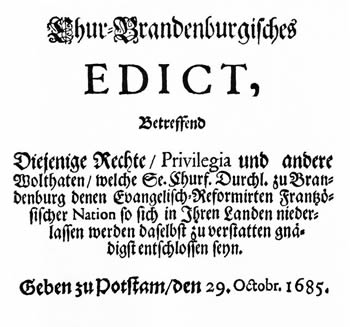
The Edict of Potsdam
The Edict of Potsdam, adopted on 8 November 1685 by the Great Elector Frederick William of Brandenburg, was an edict of toleration.
The Elector, a member of the Calvinist faith1, in contrast to the Lutheran majority of Brandenburg, offered the protestant Huguenots who were persecuted because of their religion in France, free and safe settlement in Brandenburg.
The refugees were granted, generous privileges, including exemption from taxes and customs duties, subsidies for businesses and pay for the pastor by the Principality.
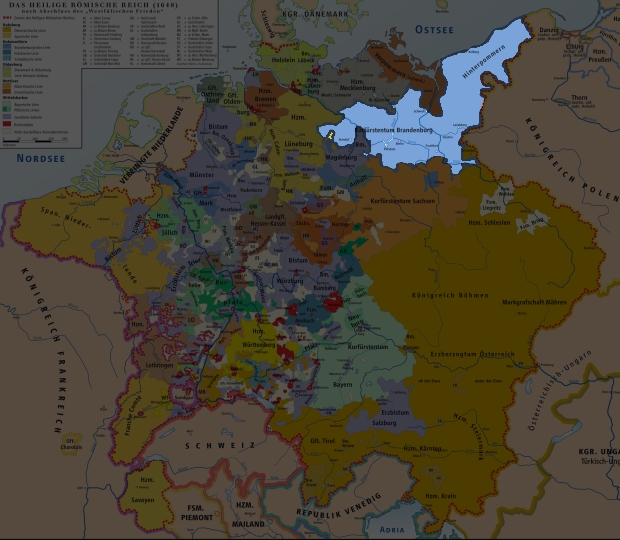
Brandenburg within the Holy Roman Empire in 1648
About 40,000 Huguenots fled to the German territories; Brandenburg-Prussia absorbed nearly 20,000 of them.
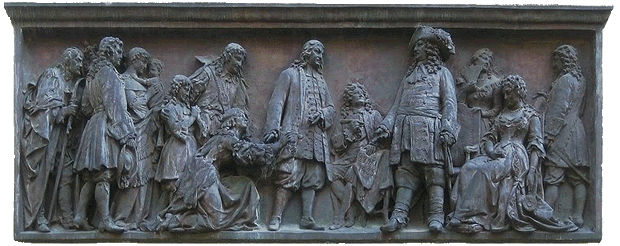
Relief of Johannes Boese: the Great Elector, Frederick William of Brandenburg
Welcoming the Arriving Huguenots (1885)
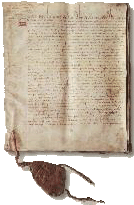
das Edict of Nantes
The background of the edict was the revival of persecution of the Huguenots in France after the revocation of the tolerance Edict of Nantes2 by the Edict of Fontainebleau3 which was signed by the French King Louis XIV on 18 October 1685. The Catholic confession was henceforth the state religion in France. Although Louis XIV had sealed off the borders of the country, a great escape began.
In addition to the religious reasons, there were also important economic reasons. In 1648 Brandenburg was a devastated country, caused by the Thirty Years War and plundering troops. Plagues and famines had raged and reduced the population dramatically.
.jpg)
Population Losses in the Thirty Years War
Cities and villages lay in ruins, the economy was shattered and the consequences of the war still were not overcome in 1685, the means to rebuild weren't sufficient, because the income of the State had decreased.
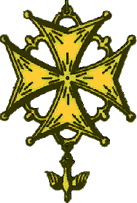
Huguenot's Cross
At the same time, spending for military and representation grew. The great elector and his advisers searched a way out of this mess in a comprehensive "Peuplierung4", the scheduled settlement of as many economically powerful new residents, as possible.
The Edict of Potsdam wasn't directed primarily to the better-off among the Huguenots, who anyway preferred developed countries such as Netherlands or England - but to the destitute, but hard-working skilled and commercially qualified immigrants.
The Edict of Potsdam was a major contributor to the revival of the economy of destroyed Brandenburg and thus laid the foundation for the strengthening of Brandenburg-Prussia. The Huguenots, who settled in Berlin, increased the population by a third.
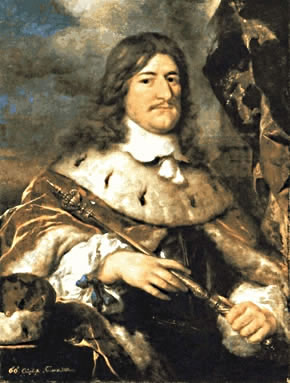
Frederick William of Brandenburg
As for the admission of the Jews expelled from Austria in 1671, Frederick William hoped from the immigrants an economic boom for Brandenburg, hopes that were fulfilled. The Huguenots in Brandenburg brought to the State both an economic as well as a spiritual recovery.
Thus, in Berlin, the French school was opened in 1689, that established a comprehensive education never offered until then granted to immigrants. Berlin became a center of literature within Brandenburg-Prussia as well as beyond the State's borders.
The transport of refugees to Brandenburg was well organized. In transit camps in Amsterdam, Frankfurt am Main and Hamburg the refugees were welcomed and were forwarded from there in the envisaged resettlement places.
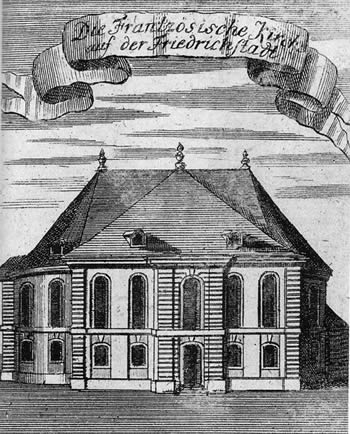
First French Church in Berlin
Here they had a number of privileges and start-up aid that had been promised to them in the 14 points of the Edict of Potsdam. Religious freedom and the exercise of their worship in French by their own clergy were guaranteed, to independence in many parts of the legal system, temporary tax exemption, free membership in the guilds, and the award of civil rights, financial incentives for commercial start-ups, property and free building materials.
A State "Commissioner's Office for French Affairs" was available as a contact on arrival. With such far-reaching concessions Brandenburg had gained an advantage over other distressed German territorial States which also endeavored to attract the influx of French refugees.
![]()
1 The Princely House of Hohenzollern of Brandenburg joined the Calvinist religion in 1613, different than the vast majority of his Lutheran Protestant subjects.
2 Edict of Nantes = The official decree which was signed in Nantes by the French King Henry IV on 13 April 1598. The decree guaranteed the freedom of religious expression and political privileges to the Calvinist Protestants (Huguenots) in Catholic France. Previously the Calvinists or Reformed Protestants suffered for more than 60 years of persecution which again and again led to civil wars, the so-called French Wars of Religion. Tens of thousands of Protestants were killed or left France during these decades.
When the Huguenots once again opposed the Crown in the wars from 1621/22 and from 1625-29, they lost all their political rights and places of safety through the actions of Cardinal Richelieu, however, they were farther tolerated religiously. This de facto acquiescence ended with the official revocation of the Edict of Nantes by Louis XIV (Edict of Fontainebleau) in 1685 which limited the freedom of worship so much that more than 200,000 Huguenots had to leave France.
3 On 18 October 1685 the Edict of Nantes was revoked in France by King Louis XIV, in the Edict of Fontainebleau. The King declared the Catholic faith as the State religion, thereby it issued the following regulations: all Protestant churches were immediately to cease worship, Ministers were to leave France within 14 days, Protestant schools were immediately to closed, children were baptized Catholic, emigration was forbidden with men sentenced to prison and women to the convent.
4 Under "Peuplierung" one understands demographic-political measures in the 18th century which should serve the settlement of areas that were population poor or empty. This should contribute to the population increase and to the economic prosperity of the country, increase the general prosperity and not least, the incomes of the sovereign. For this purpose experts were recruited from abroad most of whom were religious refugees
